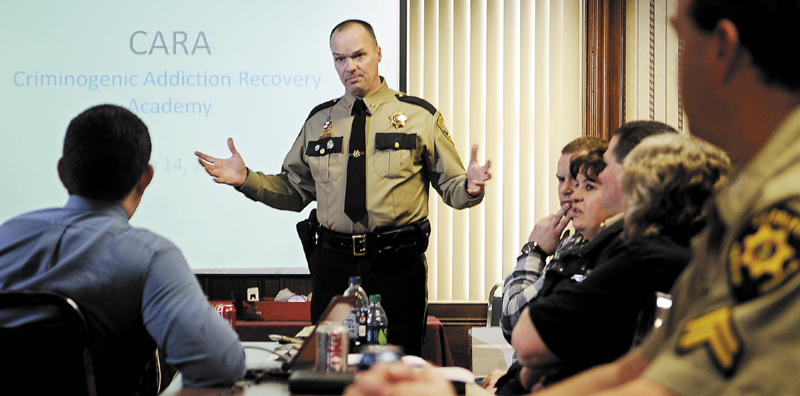AUGUSTA — Kennebec County Sheriff Randall Liberty has spent the past 30 years kicking in doors and arresting drug users and thieves.
Behind many of those doors have been suspects Liberty had arrested many times before. Even as he was leading them away, Liberty knew that it was just a matter of time before the cycle would begin again and he would be placing the cuffs on the same person for yet another offense.
Breaking that cycle was Liberty’s motivation for launching the Criminogenic Addiction Recovery Academy, known as CARA, at the Kennebec County jail in 2010. Over the past two years, the Academy has led dozens of jail inmates through five-plus weeks of intensive therapy aimed at breaking they cycle of addiction and criminal thinking that has led the men and women to break the law repeatedly.
“We have a duty to break that cycle as best we can,” Liberty recently told a group of about 30 county and state corrections officials from throughout the state who gathered to learn about CARA. “We want to have a purpose-driven incarceration.”
Liberty describes the CARA program as the most important thing he has ever done in law enforcement, but state funding shortages have placed the program as it currently exists on life support.
The Maine Board of Corrections, of which Liberty is a member, is facing a $800,000 shortfall. In the face of what promise to be painful cuts, Kennebec County needs about $300,000 to run the CARA program, County Administrator Robert Devlin said.
“Everyone is competing for very scarce funds,” he said.
Liberty said the CARA program will continue in Kennebec County even amid the cuts, because the county commissioners are committed to it.
Jail inmates across the state now can be referred to the CARA program. Liberty describes it as a Board of Corrections program that happens to be in Kennebec County.
Candidates who are cleared by the screening process move to one of the Kennebec County jail cell blocks devoted to the CARA. The blocks are designed to create a therapeutic atmosphere – inmates wear plain clothes and have more freedom to move around within the block – during five weeks of intensive counseling.
“It’s a totally different atmosphere on the cell blocks,” said Kennebec County jail Administrator Marsha Alexander.
The program also includes five weeks of re-entry assistance designed to help participants break old habits and connections that contribute to their criminal lifestyles.
‘We have faith in them’
Statistics verifying the program’s effectiveness are hard to come by. The county has hired an independent firm to conduct a comprehensive analysis.
However, Alexander said about 12 percent of CARA graduates return to jail as a result of a new crime and about 29 percent return as a result of a technical violation of their conditions of release, such as an unpaid fine. Those recidivism rates are comparable to that of the general population, but Alexander says the CARA program works exclusively with people who have developed a criminal lifestyle. Among that population, the recidivism rate approaches 100 percent, Alexander said.
“We’re seeing huge results,” she said.
Breaking the cycle of crime and punishment not only dovetails with the Board of Corrections’ mission of reducing drug dependence, but it reduces the number of inmates and the amount of money that must be spent to house them.
“It makes fiscal sense to do this,” Liberty said. “Some of these guys have $500-a-day habits. You have to turn that around.”
Beyond the statistics and the money, however, are the individual lives Alexander said have been changed as a result of the program. She recalled three people who gave up an opportunity to go free because they wanted to graduate with their class. Graduates have set up a private Facebook account to keep each other accountable and support each other.
“It’s a respect factor,” Alexander said. “There’s structure. There’s support for them. We expect respect back from them. We have faith in them.”
Program motivation
Liberty invited three recent graduates to take part in the recent information session. All three told stories of shattered home lives that led to criminal behavior before they even reached their teens.
All three had been arrested countless times and spent much of their lives in and out of jails and prisons.
“You guys have been my enemies for a very long time,” said Donald Bowden, scanning the room of law enforcement and corrections officials. “To be here, and not just sitting here, but comfortable and feeling like a part of this, is amazing.
“It’s about what God has done in my life and the community of people he’s put in my life. I have the opportunity to change generations after me.”
Testimonials like Bowden’s keep Liberty motivated to keep CARA running as a statewide program.
Even without the state funding, CARA will continue to exist to serve just Kennebec County inmates.
“This is the most impactful and fiscally responsible program I’ve ever been involved with,” Liberty said.
Craig Crosby — 621-5642
ccrosby@centralmaine.com
Send questions/comments to the editors.



Success. Please wait for the page to reload. If the page does not reload within 5 seconds, please refresh the page.
Enter your email and password to access comments.
Hi, to comment on stories you must . This profile is in addition to your subscription and website login.
Already have a commenting profile? .
Invalid username/password.
Please check your email to confirm and complete your registration.
Only subscribers are eligible to post comments. Please subscribe or login first for digital access. Here’s why.
Use the form below to reset your password. When you've submitted your account email, we will send an email with a reset code.